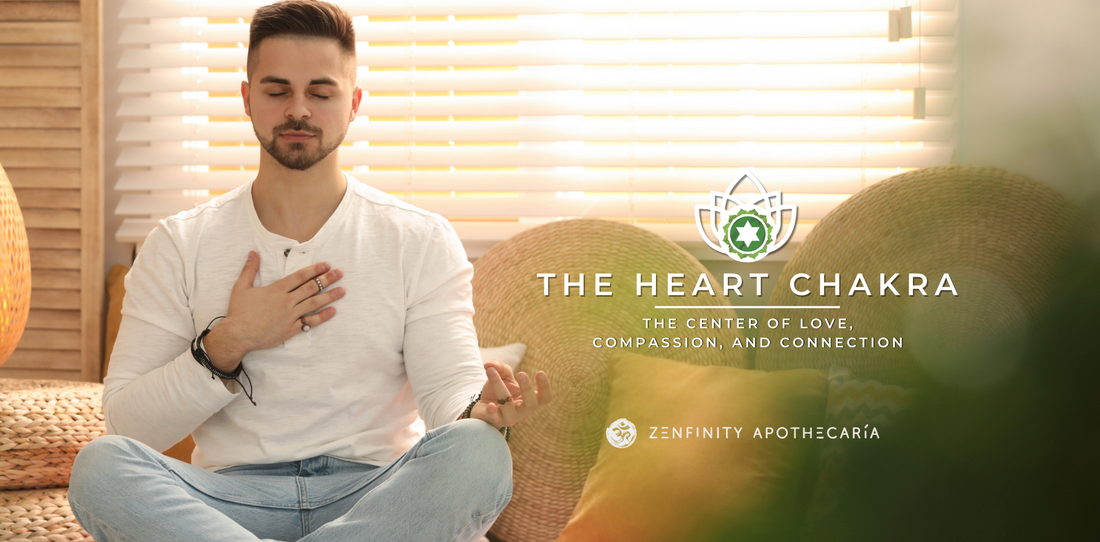The Heart Chakra, or Anahata in Sanskrit, is the fourth chakra in the human energy system, located at the center of the chest, near the heart. As the core of our emotional body, the Heart Chakra governs love, compassion, empathy, and our ability to connect with others. It serves as the bridge between the lower, more grounded chakras (which govern material and physical aspects) and the higher, more spiritual chakras (which govern intuition and higher consciousness).
In this article, we will explore the role of the Heart Chakra, how to recognize its imbalances, and how herbs and essential oils can help restore harmony to this vital energy center.
What is the Heart Chakra?
The Heart Chakra is often represented by the color green, symbolizing growth, healing, and renewal. In some traditions, it is also depicted as being pink, a color that resonates with unconditional love and compassion. The Heart Chakra is symbolized by a twelve-petaled lotus and governs the heart, lungs, circulatory system, and thymus gland. It is linked to the element of air, which is expansive, flowing, and nourishing—just like the qualities of love and connection that this chakra represents.
The Heart Chakra governs both giving and receiving love, the capacity for forgiveness, and the ability to form deep emotional connections with others. When this chakra is balanced, we are open to love, compassion, and kindness. We can both give and receive love without fear or resentment, and we feel deeply connected to others. When imbalanced, however, we may struggle with feelings of isolation, fear of vulnerability, or an inability to form healthy relationships.
The Role of the Heart Chakra in Our Lives
The Heart Chakra is the center of love, not just romantic love but also self-love, compassion, and the deep connection we share with others. It governs our ability to form emotional bonds and to feel empathy, kindness, and unconditional love. Here are the key aspects that the Heart Chakra influences:
-
Self-Love and Acceptance
At the core of the Heart Chakra is the ability to love and accept oneself. When this chakra is open, we embrace our own worth and treat ourselves with the same compassion and kindness that we would extend to others. Self-love is the foundation for forming healthy, loving relationships with others. -
Love and Compassion for Others
The Heart Chakra governs our capacity for empathy, kindness, and unconditional love toward others. It encourages us to be compassionate, to forgive, and to offer love without expectation. A balanced Heart Chakra helps us build healthy relationships based on mutual respect, understanding, and love. -
Emotional Balance
The Heart Chakra plays an important role in emotional regulation. When it is balanced, we are more able to navigate our emotions with grace and equanimity. We can experience love without being overwhelmed by it, and we can release past hurts and forgive without holding onto bitterness or resentment. -
Forgiveness
Forgiveness is a central theme of the Heart Chakra. This chakra governs our ability to heal from past emotional wounds, let go of grudges, and move forward with an open heart. It is also about forgiving ourselves—releasing guilt and shame to embrace a more loving and compassionate self-image. -
Connection and Interconnectedness
The Heart Chakra fosters a sense of oneness with others. It helps us recognize the interconnectedness of all beings, encouraging us to act with love and compassion toward ourselves and the world around us. When this chakra is open, we can feel a deep connection with others and experience the profound joy of sharing love.
Symptoms of an Imbalanced Heart Chakra
When the Heart Chakra is blocked or imbalanced, it can manifest in various physical, emotional, and behavioral symptoms. These symptoms often reflect difficulties with love, vulnerability, and connection.
Physical Symptoms:
- Chest pain or discomfort
- Heart palpitations or irregular heartbeat
- Respiratory issues such as shallow breathing, asthma, or frequent colds
- Upper back pain or tension in the shoulders
- Weak immune system, feeling more prone to illness
- Fatigue or feeling emotionally drained
- Digestive issues, particularly those related to the stomach or spleen
Emotional and Mental Symptoms:
- Emotional numbness or difficulty feeling emotions
- Chronic loneliness or feelings of isolation
- Fear of intimacy, avoiding close relationships
- Difficulty forgiving, either others or oneself
- Depression or persistent sadness
- Low self-esteem, difficulty accepting or loving oneself
- Jealousy or possessiveness in relationships
Behavioral Symptoms:
- People-pleasing behaviors, neglecting your own needs to satisfy others
- Over-giving, neglecting your own well-being in favor of others
- Holding onto past wounds and grudges
- Avoiding vulnerability, refusing to open up to others
- Difficulty expressing love, either to oneself or others
- Fear of abandonment, being overly attached or dependent on others for validation
How to Balance the Heart Chakra
Balancing the Heart Chakra involves practices that nurture self-love, compassion, and the ability to give and receive love freely. These practices also help to open the heart to forgiveness and release any emotional blockages that may be preventing love from flowing. Additionally, herbs and essential oils can be powerful allies in supporting this process and restoring balance to the Heart Chakra.
1. Self-Love and Compassion Practices
-
Heart-Centered Meditation: Meditation focused on the Heart Chakra helps to open the heart, encourage self-love, and foster compassion toward others. Visualize a green light expanding from the center of your chest, radiating love and healing energy. Focus on sending love to yourself, to others, and to the world.
-
Affirmations: Positive affirmations for the Heart Chakra help to reinforce self-love and compassion. Some examples include:
- “I love and accept myself unconditionally.”
- “My heart is open to giving and receiving love.”
- “I forgive myself and others with ease.”
- “I am worthy of love, compassion, and happiness.”
-
Journaling: Writing about your feelings can help to release emotional blockages and clarify your thoughts. Journaling can be a safe space to express love, gratitude, and compassion, whether toward yourself or others.
-
Forgiveness Practice: One of the most powerful ways to heal the Heart Chakra is by practicing forgiveness. Take time to reflect on any grudges or past wounds you may be holding onto, and consciously choose to release them. This could involve writing a letter (that you may or may not send) expressing your feelings, or simply visualizing the person or situation, offering forgiveness and letting go.
2. Herbs for the Heart Chakra
Herbs that nurture the Heart Chakra help to promote emotional healing, soothe the heart, and encourage feelings of love and compassion. Some beneficial herbs for the Heart Chakra include:
-
Rose: Rose is considered the quintessential herb for the Heart Chakra. It promotes emotional healing, fosters self-love, and encourages feelings of deep compassion. Rose petals and rose essential oil are used for their heart-opening properties.
-
Lavender: Lavender has a calming, soothing effect on the nervous system and promotes relaxation and emotional healing. It helps to ease tension and anxiety, allowing love to flow freely.
-
Hawthorn: Known for its heart-healthy properties, hawthorn supports the physical heart while also promoting emotional healing and balance. It is often used to open the heart to love and healing, particularly after emotional trauma.
-
Motherwort: Motherwort is an herb of emotional support, especially for those who have experienced heartache or loss. It can help soothe the heart and encourage feelings of safety, security, and self-love.
-
Chamomile: Chamomile is gentle and calming, promoting peace and emotional healing. It helps to release tension in the heart area and can encourage relaxation, making it easier to connect with love.
These herbs can be used in teas, tinctures, or capsules. A cup of rose tea or chamomile tea before bed can promote deep emotional healing and an open heart.
3. Essential Oils for the Heart Chakra
Essential oils are a wonderful tool for healing the Heart Chakra, as they can open the heart, promote emotional balance, and help restore a sense of love and connection. Some essential oils that support the Heart Chakra include:
-
Rose: Rose essential oil is deeply associated with the Heart Chakra. It is known to open the heart to love and compassion, promote emotional healing, and alleviate feelings of grief or heartache.
-
Geranium: Geranium essential oil helps to release emotional blockages and open the heart to self-love and compassion. It can be especially helpful in balancing emotions and fostering positive energy.
-
Lavender: Lavender essential oil is calming and soothing, helping to release stress, anxiety, and emotional tension. It helps to clear emotional blockages, allowing the heart to open to love.
-
Ylang Ylang: Ylang Ylang is a sweet, floral essential oil that has a calming effect and promotes emotional healing. It encourages unconditional love, self-acceptance, and inner peace.
-
Bergamot: Bergamot essential oil has uplifting and heart-opening properties, promoting feelings of joy and emotional balance. It helps release feelings of depression and encourages a more open, loving heart.
You can use these oils by diffusing them, applying them to your heart chakra area (diluted with a carrier oil), or adding them to a warm bath to promote emotional healing and heart-opening.
4. Physical Practices
- Yoga for the Heart Chakra: Yoga poses that open the chest, such as *Camel Pose* (Ustrasana), Bridge Pose (Setu Bandhasana), and Fish Pose (Matsyasana), are excellent for stimulating the Heart Chakra. These poses help to release tension in the chest and encourage emotional and energetic flow.
- Breathing Exercises: Deep, conscious breathing can help open the heart and release emotional tension. Try inhaling deeply into your chest and exhaling slowly, visualizing the breath as a wave of love and compassion flowing through your heart.
The Heart Chakra is the center of love, compassion, and connection. When it is open and balanced, we can experience deep love for ourselves and others, navigate our emotions with ease, and form meaningful relationships. A blocked or imbalanced Heart Chakra can lead to feelings of loneliness, fear of intimacy, and emotional pain.
By engaging in practices that nurture self-love, compassion, and forgiveness, and using herbs and essential oils to support emotional healing, we can restore balance to the Heart Chakra. Cultivating a healthy Heart Chakra allows us to experience life with an open heart, filled with love, connection, and compassion for ourselves and the world around us.





